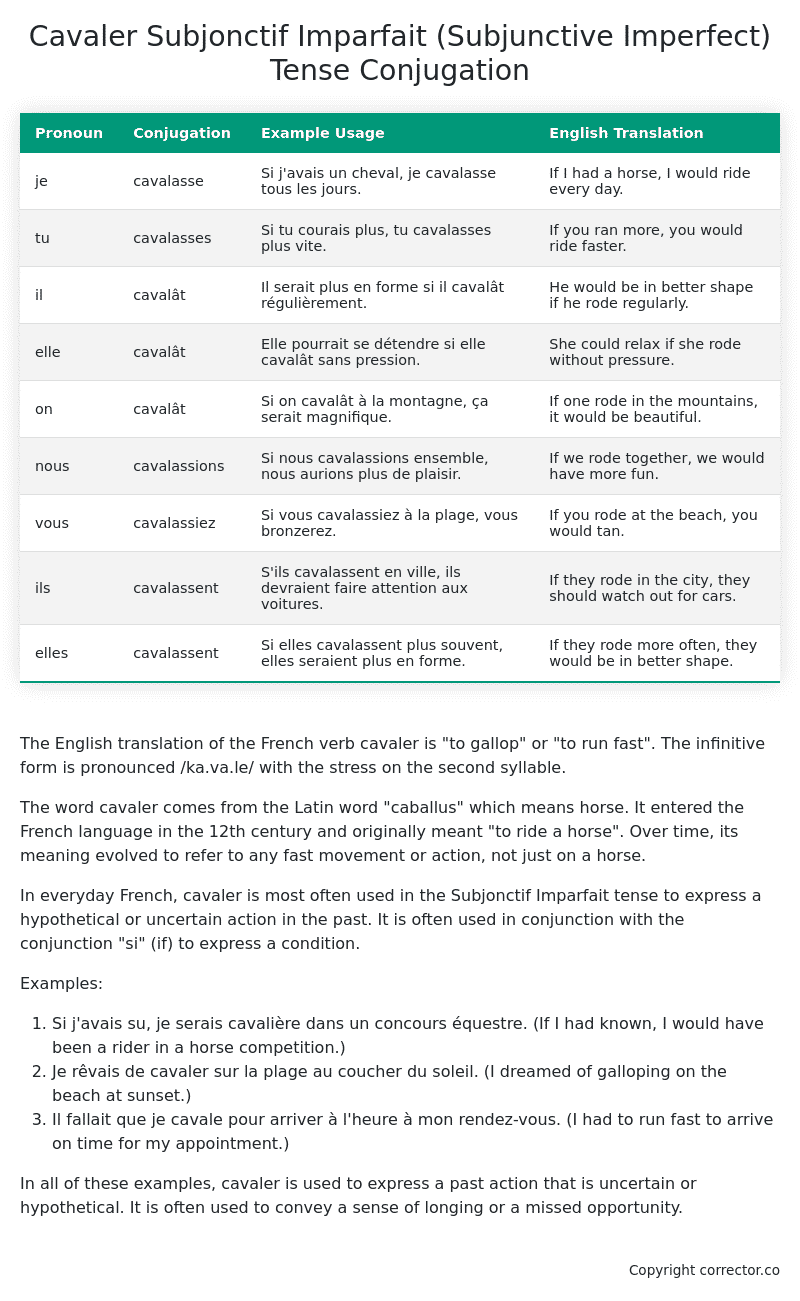Subjonctif Imparfait (Subjunctive Imperfect) Tense Conjugation of the French Verb cavaler
Introduction to the verb cavaler
The English translation of the French verb cavaler is “to gallop” or “to run fast”. The infinitive form is pronounced /ka.va.le/ with the stress on the second syllable.
The word cavaler comes from the Latin word “caballus” which means horse. It entered the French language in the 12th century and originally meant “to ride a horse”. Over time, its meaning evolved to refer to any fast movement or action, not just on a horse.
In everyday French, cavaler is most often used in the Subjonctif Imparfait tense to express a hypothetical or uncertain action in the past. It is often used in conjunction with the conjunction “si” (if) to express a condition.
Examples:
- Si j’avais su, je serais cavalière dans un concours équestre. (If I had known, I would have been a rider in a horse competition.)
- Je rêvais de cavaler sur la plage au coucher du soleil. (I dreamed of galloping on the beach at sunset.)
- Il fallait que je cavale pour arriver à l’heure à mon rendez-vous. (I had to run fast to arrive on time for my appointment.)
In all of these examples, cavaler is used to express a past action that is uncertain or hypothetical. It is often used to convey a sense of longing or a missed opportunity.
Table of the Subjonctif Imparfait (Subjunctive Imperfect) Tense Conjugation of cavaler
| Pronoun | Conjugation | Example Usage | English Translation |
|---|---|---|---|
| je | cavalasse | Si j’avais un cheval, je cavalasse tous les jours. | If I had a horse, I would ride every day. |
| tu | cavalasses | Si tu courais plus, tu cavalasses plus vite. | If you ran more, you would ride faster. |
| il | cavalât | Il serait plus en forme si il cavalât régulièrement. | He would be in better shape if he rode regularly. |
| elle | cavalât | Elle pourrait se détendre si elle cavalât sans pression. | She could relax if she rode without pressure. |
| on | cavalât | Si on cavalât à la montagne, ça serait magnifique. | If one rode in the mountains, it would be beautiful. |
| nous | cavalassions | Si nous cavalassions ensemble, nous aurions plus de plaisir. | If we rode together, we would have more fun. |
| vous | cavalassiez | Si vous cavalassiez à la plage, vous bronzerez. | If you rode at the beach, you would tan. |
| ils | cavalassent | S’ils cavalassent en ville, ils devraient faire attention aux voitures. | If they rode in the city, they should watch out for cars. |
| elles | cavalassent | Si elles cavalassent plus souvent, elles seraient plus en forme. | If they rode more often, they would be in better shape. |
Other Conjugations for Cavaler.
Le Present (Present Tense) Conjugation of the French Verb cavaler
Imparfait (Imperfect) Tense Conjugation of the French Verb cavaler
Passé Simple (Simple Past) Tense Conjugation of the French Verb cavaler
Passé Composé (Present Perfect) Tense Conjugation of the French Verb cavaler
Futur Simple (Simple Future) Tense Conjugation of the French Verb cavaler
Futur Proche (Near Future) Tense Conjugation of the French Verb cavaler
Plus-que-parfait (Pluperfect) Tense Conjugation of the French Verb cavaler
Passé Antérieur (Past Anterior) Tense Conjugation of the French Verb cavaler
Futur Antérieur (Future Anterior) Tense Conjugation of the French Verb cavaler
Subjonctif Présent (Subjunctive Present) Tense Conjugation of the French Verb cavaler
Subjonctif Passé (Subjunctive Past) Tense Conjugation of the French Verb cavaler
Subjonctif Imparfait (Subjunctive Imperfect) Tense Conjugation of the French Verb cavaler (this article)
Subjonctif Plus-que-parfait (Subjunctive Pluperfect) Tense Conjugation of the French Verb cavaler
Conditionnel Présent (Conditional Present) Tense Conjugation of the French Verb cavaler
Conditionnel Passé (Conditional Past) Tense Conjugation of the French Verb cavaler
L’impératif Présent (Imperative Present) Tense Conjugation of the French Verb cavaler
L’infinitif Présent (Infinitive Present) Tense Conjugation of the French Verb cavaler
Struggling with French verbs or the language in general? Why not use our free French Grammar Checker – no registration required!
Get a FREE Download Study Sheet of this Conjugation 🔥
Simply right click the image below, click “save image” and get your free reference for the cavaler Subjonctif Imparfait tense conjugation!

Cavaler – About the French Subjonctif Imparfait (Subjunctive Imperfect) Tense
Formation
Common Everyday Usage Patterns
Interactions with Other Tenses
Subjonctif Présent
Indicatif Passé Composé
Conditional
Conditional Perfect
Summary
I hope you enjoyed this article on the verb cavaler. Still in a learning mood? Check out another TOTALLY random French verb conjugation!


